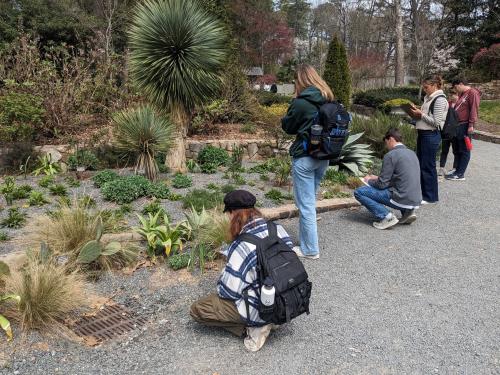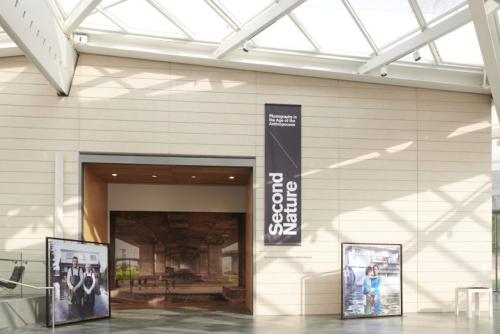
Introducing Dr. Palmquist
Dr. Aunchalee Palmquist, a professor at Duke and a CAST (Climate and Sustainability Teaching) Fellow, brings a unique interdisciplinary perspective to her work. Trained as a medical anthropologist, she has spent her career examining how ecological and social factors shape health outcomes. Early in her career, Dr. Palmquist conducted research in Pacific Islander communities, studying the health effects of globalization. This experience fueled her interest in how climate-related changes impact health, particularly in vulnerable populations. Her work on infant feeding in humanitarian crises gave her a firsthand understanding of the disproportionate challenges that pregnant people and young children face in these settings. Now, she brings this expertise to Duke, where she is helping shape the future of applied climate and sustainability education in global health.
Global Maternal and Child Health Course

Dr. Palmquist’s Global Maternal and Child Health course offers Duke students a distinctive approach to public health by combining topics of maternal and child health with climate change and social justice. Supported by the CAST Fellowship, she developed the course to go beyond traditional lectures, emphasizing experiential learning that helps students explore the connections between health, environment and sustainability. This interdisciplinary approach encourages students to see maternal and child health not only through a clinical or community health lens but also through a broader ecological perspective. By focusing on vulnerable populations such as pregnant people, infants and young children, Dr. Palmquist’s course highlights how climate change disproportionately affects those with unique health needs, inviting students to think critically about equity and justice in health care.
“The purpose of the course is both to ground students in understanding maternal and child health as a special population and also thinking deliberately about the ways that maternal and child health is shaped by local context, local ecologies and the broader idea of climate change.”
Dr. Aunchalee Palmquist
In line with Duke’s Climate Commitment and sustainability mission, Dr. Palmquist aims for students to leave her course with a deep understanding of the social determinants of health. Her course modules cover a wide range of topics, including reproductive justice, food security and Indigenous knowledge systems. Each topic encourages students to consider the health of populations within a specific ecological context, preparing them to address complex, real-world challenges with a holistic approach.
Using the Campus as a Living Laboratory
One of the most innovative aspects of Dr. Palmquist’s course is her use of Duke’s campus as a “Living Learning Laboratory,” allowing students to engage directly with their environment. Through thoughtfully planned field trips, students explore sustainability concepts firsthand and make connections to their coursework in a tangible way.

Sarah P. Duke Gardens: Early in the semester, Dr. Palmquist brought her students to Duke Gardens to explore the relationship between plant life and Indigenous knowledge systems. The experience included a self-led scavenger hunt. Students were tasked with locating medicinal plants from Mongolia, each significant for its role in cultural rituals or traditional medicine. By engaging with the plants in the gardens, students gained a deeper appreciation of how human health is tied to the natural world, seeing firsthand how plants are cultivated for their cultural and medicinal value. For many students, especially those from Duke Kunshan University who were new to the Durham campus, this field trip was a memorable first introduction to Duke Gardens.

Duke Campus Farm: Another highlight was a visit to Duke Campus Farm, where students explored the complex relationships between food security, nutrition and climate change. Dr. Palmquist collaborated with the farm staff to create an experience centered on sustainable food systems. In a module focused on food security, students discussed the impacts of climate-related challenges—such as hurricanes and droughts—on food production and the importance of resilient, sustainable farming practices. They even examined soil samples, learning how to “read” the history of a place through its soil composition. This field trip connected students with the local Durham community’s food needs and gave them a new perspective on how sustainable practices can combat climate change and support community health resilience.

Nasher Museum of Art: Dr. Palmquist also plans to incorporate trips to the Nasher Museum of Art. By viewing exhibits on themes like the Anthropocene, students engage with complex topics through art, which complements their understanding of Indigenous ways of knowing and environmental justice.
These field trips provide students with a multifaceted view of how humans interpret and respond to environmental challenges, enriching the academic experience with creative perspectives.
Plans for the Course in the Future
Dr. Palmquist is continually looking for new ways to make her GLHLTH 571 course even more impactful. Though not included in this semester’s list of field trips, she hopes to incorporate a guided walk in Duke Forest as part of a module on Black maternal and infant health in the U.S. This immersive experience would take students along trails that reveal remnants of past land use, including areas cultivated by enslaved people. She envisions this “meditative walk” as a way for students to connect historical injustices with present-day health disparities, exploring how the legacy of systemic inequities continues to shape health outcomes today.
Additionally, Dr. Palmquist has plans to add a water-focused module in future courses, potentially incorporating Duke’s water reclamation pond, and the Duke University Marine Lab as a field sites. This new module would explore the ecological significance of water sources and their impact on human health, particularly in coastal and marine environments. Dr. Palmquist hopes that by expanding the course to include more interactive elements, students will gain a stronger sense of connection to the course material, the land and each other.
Shaping the next generation of climate leaders
Dr. Palmquist’s commitment to making her course as immersive and applied as possible for her students is undeniable. She sees Duke University’s natural resources as valuable teaching tools that help students understand the real-world impact of climate and sustainability issues on health. Her long-term vision includes continued collaboration with other departments, further enriching her course with diverse perspectives and resources across campus.
Dr. Palmquist’s innovative approach exemplifies Duke’s commitment to using the campus as a learning laboratory for applied climate and sustainability education, emboldening students will skills and knowledge to take into their careers.
For those interested in using Duke’s campus as a learning lab like Dr. Palmquist has done, please read more about the Sustainability and Climate Applied Learning (SCALe) program for resources and support.
This article is part of the SCALe Spotlight series hosted by the Office of Climate and Sustainability. The Sustainability and Climate Applied Learning (SCALe) Spotlight stories celebrate Duke students, staff, faculty and community partners who demonstrate a commitment to sustainability and climate education through applied teaching, learning and action.
Nominate someone today to shine the SCALe Spotlight on them!
Article written by Mason Ibrahim